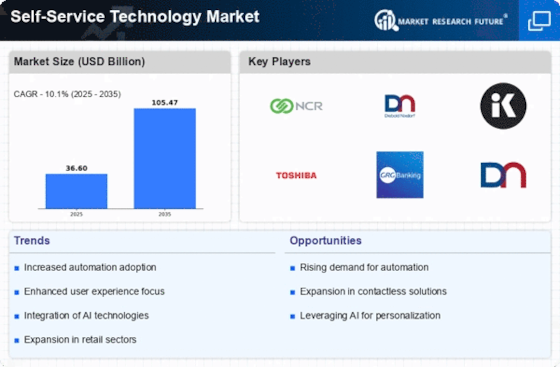Top Industry Leaders in the Self Service Technologies Market

Competitive Landscape of the Self-Service Technology Market:
The self-service technology market is experiencing explosive growth, fueled by rising customer expectations for convenience and efficiency, coupled with advancements in automation and artificial intelligence. This dynamic landscape presents a unique blend of established players, disruptive newcomers, and diverse strategies vying for market dominance. Understanding the key players, their strategies, and the factors influencing market share is crucial for any stakeholder navigating this dynamic ecosystem.
Key Players:
- IBM Corporations (US)
- Azkoyen Group (Spain)
- Crane Co. (US)
- Dendrite (US)
- Glory Ltd (Japan)
- NCR (US)
- Kiosk Information Systems (US)
Strategies for Market Share Domination:
- Product Innovation: Leading players are constantly innovating, introducing new features like biometric authentication, voice recognition, and augmented reality into self-service technologies. This focus on enhanced user experience and personalization aims to attract customers and stand out from the competition.
- Strategic Partnerships: Collaborations between hardware and software providers, as well as partnerships with retailers and other service providers, are becoming increasingly common. By combining expertise and resources, companies can offer comprehensive and tailored self-service solutions to specific customer segments.
- Data-Driven Insights: The ability to collect and analyze data from self-service platforms is crucial for optimizing performance and personalizing the customer experience. Leading players are investing heavily in analytics tools and AI-powered insights to gain a competitive edge.
- M&A Activity: Mergers and acquisitions are a significant driver of market consolidation. Established players are acquiring smaller companies with niche technologies or expertise to expand their product offerings and reach new customer segments.
Factors Influencing Market Share Analysis:
- Product Type: Different self-service technologies cater to specific applications and industries. ATMs, kiosks, and vending machines dominate in traditional segments, while AI-powered solutions are gaining traction in retail and other sectors. Analyzing market share by product type provides a nuanced understanding of the competitive landscape.
- Geographical Distribution: The self-service technology market varies significantly across regions. North America and Europe are mature markets with established players, while Asia Pacific and Latin America offer high growth potential for new entrants. Understanding regional market dynamics is crucial for successful global expansion.
- Industry Vertical: Different industries have distinct self-service needs. Retail, finance, healthcare, and transportation are key verticals with diverse requirements. Analyzing market share by industry vertical allows for targeted strategies and tailored solutions.
New and Emerging Companies:
The self-service technology market is constantly evolving, with new entrants emerging regularly. Some promising areas of innovation include:
- Voice-activated self-service: Companies like Amazon and Google are developing voice-based solutions for ordering food, booking appointments, and accessing information.
- Biometric authentication: Fingerprint and facial recognition technologies are being integrated into self-service platforms for enhanced security and personalized experiences.
- Self-driving robots: Companies like Starship Technologies are developing self-driving delivery robots for retail and other applications, further blurring the lines between physical and digital self-service.
Current Investment Trends:
Companies across the self-service technology spectrum are investing heavily in R&D, focusing on:
- Artificial intelligence and machine learning: AI-powered solutions are being developed for optimizing self-service platforms, enhancing user experience, and providing personalized recommendations.
- Cloud-based solutions: The shift towards cloud-based deployments offers scalability, remote management, and easier integration with existing systems.
- Cybersecurity: With increasing data collection and reliance on digital infrastructure, robust cybersecurity measures are becoming a top priority for self-service technology providers.
Latest Company Updates:
Jan 2024, Mastercard partners with fintech startup Zippin to enable frictionless checkout using facial recognition in grocery stores.
Dec 2023, Amazon Go stores expand rapidly, reaching over 300 locations globally, showcasing the success of cashierless checkout technology.
Nov 2023, McDonald's launches its first fully autonomous restaurant in Texas, powered by self-service kiosks and AI-driven food preparation.










